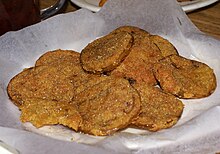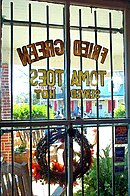Fried Green Tomatoes: Difference between revisions
TheMovieBuff (talk | contribs) |
Radosław10 (talk | contribs) |
||
| Line 129: | Line 129: | ||
[[Category:Films set in the 1920s]] |
[[Category:Films set in the 1920s]] |
||
[[Category:LGBT-related films]] |
[[Category:LGBT-related films]] |
||
[[Category:Films directed by Jon Avnet]] |
|||
[[de:Grüne Tomaten]] |
[[de:Grüne Tomaten]] |
||
Revision as of 23:09, 10 October 2008
| Fried Green Tomatoes | |
|---|---|
 Movie poster | |
| Directed by | Jon Avnet |
| Written by | Fannie Flagg Carol Sobieski |
| Produced by | Jon Avnet |
| Starring | Kathy Bates Mary Stuart Masterson Mary-Louise Parker Jessica Tandy |
| Cinematography | Geoffrey Simpson |
| Edited by | Debra Neil-Fisher |
| Music by | Jo Jo Hailey K-Ci Hailey Thomas Newman |
| Distributed by | Universal Pictures |
Release dates | December 27 1991 (USA) March 13 1992 (UK) March 26 1992 (Australia) |
Running time | 136 min. |
| Country | United States |
| Language | English |
| Box office | $80,100,000 (USA) |
Fried Green Tomatoes is a 1991 drama film based on the novel Fried Green Tomatoes at the Whistle Stop Cafe by Fannie Flagg. It was released in the UK under the novel's full title.
The film was directed by Jon Avnet and written by Fannie Flagg and Carol Sobieski. It stars Kathy Bates, Jessica Tandy, Mary-Louise Parker and Mary Stuart Masterson. It received a PG-13 rating from the MPAA.
Cast
- Kathy Bates as Evelyn Couch
- Mary Stuart Masterson as Idgie Threadgoode
- Mary-Louise Parker as Ruth Jamison
- Jessica Tandy as Ninny Threadgoode
- Cicely Tyson as Sipsey
- Chris O'Donnell as Buddy Threadgoode
- Stan Shaw as Big George
- Gailard Sartain as Ed Couch
- Timothy Scott as Smokey Lonesome
- Gary Basaraba as Grady Kilgore
- Lois Smith as Mama Threadgoode
- Danny Nelson as Papa Threadgoode
- Jo Harvey Allen as Women's Awareness Teacher
- Macon McCalman as Prosecutor
- Richard Riehle as Reverend Scroggins
- Raynor Scheine as Curtis Smoot
- Grace Zabriskie as Eva Bates
- Reid Binion as Young Julian
- Nick Searcy as Frank Bennett
Plot summary
Evelyn Couch (Kathy Bates) meets an elderly woman named Ninny Threadgoode (Jessica Tandy) in a nursing home waiting room. Ninny tells her the story of the now-abandoned town of Whistle Stop, Alabama, and the people that lived there - specifically the tale of the relationship between Imogen (Idgie) Threadgoode and Ruth Jamison, the two women who ran the Whistle Stop Cafe. As the story of Idgie and Ruth (and a missing person, Frank Bennett) develops, Evelyn Couch finds herself being empowered by the stories of the strong-willed Idgie and the fiercely loyal and independent Ruth. She also finds a true best friend in Ninny.
Expanded information
The action takes place in Alabama. The heroine, Evelyn Couch, is a housewife. Evelyn is unhappy with her life and her marriage and her husband Ed appears not to be interested in her any more. Their son Cal is grown and is "busy with his own life." She has many problems including needing more confidence in herself. She and Ed are visiting his aunt in a nursing home and in a waiting room, she meets a very pleasant old woman - Ninny Threadgoode.
Ninny tells her stories about the life of two women she knew long ago. The heroines of her story are Idgie Threadgoode and Ruth Jamison, who together ran the Whistle Stop Cafe in Ninny's small Alabama hometown. The main dish served there is fried green tomatoes. From Ninny’s recollections, Evelyn learns that Ruth loved Idgie’s brother Buddy, who lost his life in a railway accident. Then follows the story of the relationship between Ruth and Idgie.
Ruth and Idgie’s story is about their life after Buddy's death. Idgie helps Ruth to become free from her abusive husband, Frank Bennett. These two strong women work together to raise Ruth's son and face the trials of life during and just after the Great Depression.
The recollections of Ninny greatly influence Evelyn. First, she is inspired by the strength of these two independent women, and Evelyn’s life changes for the better. Secondly, she finds a true best friend in Ninny. Evelyn invites Ninny to live with her after Ninny's house in Whistle Stop is demolished.
The ending implies that Ninny is in fact Idgie herself, but other statements during the film do not support this. However, these other statements are Ninny's, so it is possible to take them with a grain of salt.
Differences between the film and novel
The film version does not present the lesbian romance between the two central characters, making it appear, to viewers who had not read the book, that Idgie and Ruth were merely best friends. The DVD edition of the film has an audio commentary with the director acknowledging this and pointing out that a scene between the two women engaging in a food fight was intended to be seen as symbolic love-making. At the time of the film's debut, it was criticized by many reviewers for what was seen as "glossing over" the lesbian overtones of the relationship, although the film did win an award from the Gay & Lesbian Alliance Against Defamation (GLAAD).
The character Artis O. Peavey, who was a favorite of many in the novel, was completely omitted from the film. Additionally, in the novel, every important character has his or her own backstory, but nearly all of these were eliminated in the film version for the sake of running time and a clearer narrative.
In the novel, Evelyn tries, unsuccessfully, to lose weight on her own several times and, eventually, resorts to going to a weight loss spa. In the film, Evelyn is able to control her dietary habits and maintain a regular exercise regimen on her own.
In the novel, Ninny passes away while Evelyn is visiting a weight loss spa. However, in the film, Ninny leaves the nursing home and ends up going to live with Evelyn and Ed in their home.
The novel's version of Evelyn is somewhat darker than her film portrayal. In the novel, Evelyn is extremely depressed over her weight and her personal life to the point of considering suicide. While her unhappiness with her marriage and weight are stated in the film, the degree of seriousness is much lighter than in the novel.
The passage of time in the novel and the film is portrayed differently. In the novel, the events of the story are stretched and explored from just after the ending of World War I up to the late 1980's. In the film, most of the story takes place between 1919 and the late 1930's. However, the modern day sequences involving Evelyn, her husband, and Ninny still take place in the 1980's.
In the novel, Idgie and Big George are placed on trial for the murder of Frank Bennett years after Ruth has died. In the film, the trial takes place less than a year before Ruth's death in which she testifies on Idgie's behalf.
At the conclusion of the movie, it is implied that Idgie and Ninny are the same person, and that Ninny has been recounting tales of her own youth when telling Evelyn about Idgie. However, in the novel, Idgie is explicitly another character. Third-person narrative sections of the novel feature Ninny and Idgie interacting. After Ninny's death, her next-door neighbor recalls Ninny and Idgie as separate people, and the book's concluding section (set after Ninny's death) features Idgie working at a roadside food stand.
Reception
Critical reception
Fried Green Tomatoes was generally well received by critics. Film review aggregate website Rotten Tomatoes gave the film a "fresh" score of 82% based on 22 reviews.[1]
Box office
The film grossed a total of $82,418,501 in the United States alone, and took in $37,000,000 outside the U.S., bringing the total to $119,418,501 worldwide.[2]
Awards
The movie was nominated for Academy Awards for Best Actress in a Supporting Role (Jessica Tandy) and for Best Writing, Screenplay Based on Material from Another Medium (Fannie Flagg and Carol Sobieski). Several online reviewers, however, feel that Mary Stuart Masterson should have been nominated for Best Actress, for her performance as Idgie.
The Café

The "Whistle Stop Café" is loosely based on a real-life restaurant, the Irondale Café in Irondale, Alabama. The restaurant is still very much in operation, and is something of a local tourist attraction, thanks to the novel and movie. It is famous for its fried green tomatoes, and is located adjacent to the main line of the Norfolk Southern Railroad (formerly Southern Railway) and very near one of the line's large classification yards.
Irondale is a suburb of Birmingham, Alabama, Flagg's birthplace.
After the film became a hit, the set used as the Whistle Stop Café, on location in Juliette, Georgia, was converted into a real restaurant, and is still a tourist attraction.
A second Whistle Stop Café location can now be found on Houston Rd in Macon, Georgia. A third Whistle Stop Cafe can be found in downtown Kennesaw in Georgia.
References
- ^ "Fried Green Tomatoes Movie Reviews". Rotten Tomatoes. Retrieved 2008-04-11.
- ^ "Fried Green Tomatoes (1991)". Box Office Mojo. Retrieved 2008-04-05.
